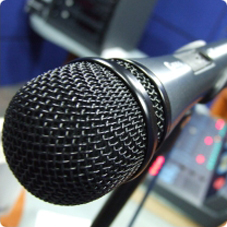
The State Board of Education approved a legislative wish list Tuesday that excluded any money for public broadcasting, throwing the future of state-funded public broadcasting into question.
This budget request keeps the board in line with Gov. Rick Scott’s veto in May of $4.8 million the Legislature had approved for public broadcasting.
That marked the first time in more than 35 years the state did not provide funding for public broadcasting.
An effort by board member A.K. Desai to re-install the funding failed after the six other board members rejected the idea. Board members are appointed by Scott. Education Commissioner Gerard Robinson also sits on the board.
“What do they do for education?” asked Board Chair Kathleen Shanahan. After hearing an explanation from Desai, Shanahan said it wasn’t one of the board’s priorities.
Public broadcasting falls under the purview of the Department of Education because it provides educational opportunities for children, in the form of the popular Sesame Street television show, for instance.
Florida has 26 public broadcasting stations, half of which are television stations and half of which are radio stations. They operate on a mixture of listener donations, federal and state dollars and corporate donations.
Typically, public broadcasting stations do not have commercials and offer programming that is intended to educate and promote public discourse, such as National Public Radio news radio updates.
But public broadcasting has lately become a target for some conservative lawmakers and governors because of its perceived liberal bent and the contention that it should not be supported with state or federal funds.
“My impression is that this is a political move by the governor that is unjustified,” said Rick Schneider, the president of WPBT2 in Miami, a public television station. He is also the chairman of the Florida Public Broadcasting Service, but stressed his opinion on Scott did not represent the organization.
Schneider called Scott’s veto in May a “serious blow” to Florida’s public broadcasting stations.
“Florida public broadcasting stations have received an appropriation for more than 35 years,” Schneider said. “This is the end of a longstanding partnership with the state and the Department of Education. We hope it is not ended for good.”
Some stations have been hit hard by the cuts that went into effect in July. Because each station received a similar amount, the smaller stations were impacted the most.
“The effect is that stations have a substantially smaller amount of money to deal with,” Schneider said. “And that means different things in different communities but it ranges from severe to catastrophic.”
At WJCT Public Broadcasting in Jacksonville, President and CEO Michael Boylan said he is telling fans of the television and radio stations that the cuts will have an impact on programming, and urging their support.
Boylan said the cut – roughly $500,000 – amounted to nine percent of his operating budget.
“That comes on the heels of four to five years of declining revenues because of the economy in general,” Boylan said. “This is not something we can absorb.”
At least one station, WDSC in Daytona Beach, no longer offers PBS broadcasting because of Scott’s veto, while others have had to undergo layoffs or slash programs, said public broadcasting station executives.
Schneider said he is hopeful the many Republican and Democratic lawmakers that support public broadcasting will work to restore funding. But even if the Legislature restores the funding, Scott could veto it again.
Sen. David Simmons, R-Maitland, who chairs the education appropriations committee in the Senate, said he did not agree with the direction the State Board of Education is taking.
“I do not approve of it, however I do respect their position as well as the governor’s position in this, given the difficult economic times that we have,” Simmons said. “It will be a matter that will be thoroughly debated in the Senate and in my committee,” adding that it is “not a dead issue.”
He said the purported liberal bias of public broadcasting has never been in a factor in his support for providing state funds for public broadcasting. “Education funding for public broadcasting, at least from my perspective, deals with the benefit of education programs for the youth,” Simmons said. “That is the reason I have supported it.”
The State Board of Education did recommend preserving funding for the Florida Channel, which was shielded from a veto and did not undergo substantial cuts this year.
The legislative budget request includes $2.6 million to operate the Florida Channel, which broadcasts public meetings and legislative proceedings, and $265,910 for Florida Channel “space and equipment.”
Meanwhile, public broadcasting stations say they need to do a better job of educating Floridians and lawmakers as to what they do.
“The culture now is ‘what is the return for the tax dollar we are spending,’ ” Boylan said. “We need to have more education within the Department and other partners and say ‘this is a valuable asset.’ ”
By Lilly Rockwell



Scott can’t think for himself. He’s getting his entire agenda from the Koch Brothers.
What do they do for education? Ever heard of Sesame Steet Kathleen?
We spent around 6 years building and maintaining websites and never made much more than a $1000 a month, give or take.